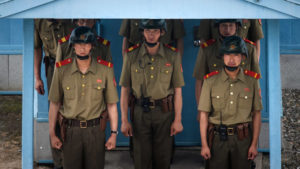 President Trump’s pledge on Tuesday to cancel military exercises on the Korean Peninsula surprised not only allies in South Korea but also the Pentagon.
President Trump’s pledge on Tuesday to cancel military exercises on the Korean Peninsula surprised not only allies in South Korea but also the Pentagon.
Hours after Mr. Trump’s announcement in Singapore, American troops in Seoul said they are still moving ahead with a military exercise this fall — Ulchi Freedom Guardian — until they receive guidance otherwise from the chain of command.
Lt. Col. Jennifer Lovett, a United States military spokeswoman in South Korea, said in an email that the American command there “has received no updated guidance on execution or cessation of training exercises — to include this fall’s schedule Ulchi Freedom Guardian.”
“We will continue with our current military posture until we receive updated guidance from the Department of Defense,” she added.
In Washington, officials at the Pentagon, State Department and White House were scrambling to figure out exactly the impact of Mr. Trump’s comments.
“The Department of Defense continues to work with the White House, the interagency, and our allies and partners on the way forward,” Lt. Col. Christopher Logan, a Pentagon spokesman, said in an email. “We will provide additional information as it becomes available.”
In Seoul, President Moon Jae-in of South Korea hailed Mr. Trump’s summit meeting with the North Korean leader, Kim Jong-un. Mr. Moon called the joint statement that was released after the meeting “a historic event that has helped break down the last remaining Cold War legacy on earth.”
But Mr. Trump’s promise to end joint military exercises with Seoul left many South Koreans stunned. The annual exercises have been an integral part of the alliance, forming the bulwark of South Korea’s defense against North Korea and Seoul’s sense of security among bigger powers in the region.
Ulchi Freedom Guardian is one of the largest military exercises in the world. The war games, which last year ran for 11 days, have involved some 17,500 American forces, including about 3,000 from outside the peninsula, and 50,000 South Korean troops. The exercises include computer simulations carried out in a large bunker south of Seoul intended to check the allies’ readiness to repel aggressions by North Korea.
Mr. Trump’s announcement raised fears in the South Korean capital that Washington was making concessions too fast, before North Korea has dismantled its nuclear weapons.
The South Korean Defense Ministry hurriedly issued a curt statement saying that it was trying to figure out Mr. Trump’s intentions.
American officials said the military exercises are important because the allies use them to ensure readiness and promote the ability to operate with similar equipment and tactics. On a strategic level, they demonstrate the strength of the decades-long alliance with South Korea.
“On the face of it, seems like a pretty big concession,” said Brian McKeon, who was a senior Pentagon official during the Obama administration.
Mr. McKeon added that it was unclear whether Mr. Trump’s order applies only to major war games like Ulchi Freedom Guardian, or a series of other smaller, but important, training maneuvers. “It would definitely impact readiness” of both American and South Korean forces, he said.
The president’s statement also confused officials in Washington. While “war games” would be canceled, Vice President Mike Pence assured Republican senators that routine military exercises involving American and South Korean troops would continue, said Senator Cory Gardner, Republican of Colorado.
“@VP was very clear: regular readiness training and training exchanges will continue,” Mr. Gardner said in a Twitter post.
In a Tuesday news conference in Singapore, before heading back to Washington, Mr. Trump focused on the potential cost savings of ending major exercises, which he said were “tremendously expensive” to conduct.
“We will be stopping the war games, which will save us a tremendous amount of money,” the president said, also criticizing South Korea for not defraying more of the costs. “We have to talk to them. We have to talk to many countries about treating us fairly.”
Mr. Trump singled out long-range bombers, like B-52s and B-1s, that routinely fly in exercises near the Korean Peninsula.
“We fly in bombers from Guam,” Mr. Trump said. “I said it when I first started, I said, ‘Where do the bombers come from? Guam. Nearby.’ I said ‘Oh great, nearby, where is nearby?’ Six and a half hours. Six and a half hours. That’s a long time for these big massive planes to be flying to South Korea to practice and then drop bombs all over the place and then go back to Guam.”
“I know a lot about airplanes,” Mr. Trump added. “It’s very expensive. I didn’t like it. What I did say is and I think it is very provocative.”
Kathleen Hicks, another former senior Pentagon official in the Obama administration, said that Mr. Trump’s cost argument was misleading since any savings would likely decrease combat readiness.
“It is true that if you don’t choose to ready your force, you can cut costs,” she said on Tuesday. “But the administration should be acknowledging that it is in fact a readiness decrement.”
Senator Lindsey Graham, the Republican of South Carolina who speaks to Mr. Trump regularly, played down the impact of halting any exercises. But he strongly cautioned against another proposal Mr. Trump has been weighing: reducing the 28,500 American troops now stationed on the Korean Peninsula.
“I don’t think canceling a war game is going to matter over the arc of time,” Mr. Graham said on NBC’s “Today” program.
“The one thing that I would violently disagree with is removing our troops,” he said. “I can’t imagine I would vote for any agreement that requires us to withdraw our forces because that would destabilize Asia. That’s what China wants. That doesn’t make the world more peaceful, it makes it more dangerous.”
